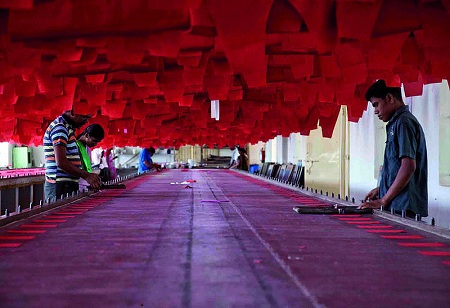The textile state of India,
Gujarat, is often described as the “growth engine” for India’s economy. Over the years, the state's
textile industry has made rapid strides, evolving as a leader not just in domestic but also in the global domain. The state is now the second largest exporter of textiles and jute goods in the world. Gujarat’s textile industry accounts for 18% of global silk production and 59% of the world’s loom capacity, making it the second-largest region for textile manufacturing capacity in the world today.
Today, 12 percent of India's total textile exports is satisfied by the state and it offers a wide range of benefits to its textile industry, including industry-friendly legislation, robust infrastructure (from roads to ports), 30 sanctioned textile parks, entrepreneurship, and access to a variety of resources, etc. Gujarat possesses the full ecosystem that is necessary to build a robust textile industry, from cotton, yarn, and fabric to processing and training facilities. In this article let's look at the key moves that have boosted the growth of Gujarat's textile industry in the past and will lead the way for a robust future.
Robust Educational Infrastructure
The potential of every industry to develop and prosper is determined by the efficiency and knowledge of its employees. By concentrating on Gujarat's educational infrastructure, the significance of this phrase may be appreciated. In Gujarat, there are around 28 industrial training institutes (ITIs) that provide training courses in the textile and garment industries, with a total intake of 6000 students. Cutting and Sewing, Cutting and Embroidery, and Needle Work Computer-aided Dress Making and Dress Design, Tailoring, Pattern Making, Finishing Garment Checking, and other textile development courses are available at these institutes.
There are many colleges in the state which offer bachelor's and master’s degrees in textile technology. Along with the Ahmedabad Textile Industrial Research Association (ATIRA), the Man-made Textile Research Association (MANTRA), the National Institute of Fashion Technology (NIFT), the Apparel and Leather Technics (ALT) Training College, the National Institute of Design (NID), and the Surat Education and Research Society, there are also other major academic institutions across the state that offer 18 training programmes.
